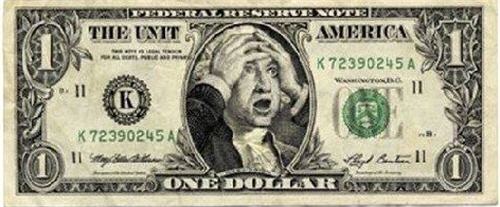
Martin Wolf, the chief economics commentator at the Financial Times, told an Atlantic Council audience earlier today that the global financial crisis has “re-emphasized the centrality of the U.S. dollar as a currency” and demonstrated once again that “when things go really badly lots of people want go to the U.S. even if U.S. is why, even in part, things are going so badly.”
What’s especially ironic about this, aside from the crisis being at last partly our doing, is that, as Kishore Mahbubani points out, “U.S. and European policymakers are doing the opposite of what they advised Asian policymakers to do in 1997-98: do not rescue failing banks, raise interest rates, balance your budget. Millions of Indonesians and Thais would have been better off if their governments had been permitted to do what western governments are doing now.” Indeed, as he points out, Asian governments are acting with remarkable calm during the crisis and showing more confidence in free market mechanisms than we are.
Why, then, isn’t the world rushing to put their money in Asian stocks and currencies? China, after all, has a massive surplus and is on the rise, and Japan is recovering nicely from its own financial collapse.
Wolf provided part of the answer in a recent column:
In its new Global Financial Stability Report, the International Monetary Fund re-estimates losses on U.S. loans at $425bn and mark-to-market losses on US mortgage, consumer and corporate debt at $980bn, for a total $1,405bn, up from $945bn last April (see chart). How much of this will be realised is unknown. It could be substantially less. If the economy went into a deep recession, however, it could be considerably more. But, at this point, this is “only” 10 per cent of US gross domestic product.
This is not by any means extraordinary for a big financial crisis. Moreover, close to half of these losses will fall outside the US (the joys of risk diversification!). So the total losses are now “only” 5 per cent of combined US and European GDP. A part, moreover, of the total has already been made good, by raising about $430bn in additional capital (on what mostly turned out to be catastrophic terms for shareholders).
The U.S. economy is simply massive; even a trillion dollar bailout/rescue is well within its means to absorb.
Beyond that, as Wolf pointed out in the Q&A during today’s talk, for all of the Western economies’ failings, there’s simply no viable alternative on the horizon. The “authoritarian capitalists do not offer a model of a global economy at all” and are “overwhelmed” by domestic challenges of their own. Even China, which has made massive strides since Mao’s passing from the scene three decades ago, still has massive internal problems and is incredibly reliant on its dollar-based investments.
Further, as George Mason University economist Tyler Cown pointed out recently, the mere fact that the United States is continuing to slog on despite the financial crisis boosts confidence overseas.
[T]he Chinese now regard us as “battle tested.” We have been through some truly major bumps, yet no major U.S. politician has called for “not paying back the Chinese.” We’ve even guaranteed the $350 billion in agency securities held by the Chinese central bank and without a stir. I think the Chinese are shocked by that, and in many ways they now trust their investments more than before, not less.
The Chinese do not have comparable trust in “Europe.” If something went wrong in the financial realm, who would they call up on the phone? Which country? What do they think is the power base of the head of the ECB? What political party does that person belong to? What favors can be traded and with whom? Whose answer would count as definitive? Keep in mind that for all of China’s modernity, their leaders are still communist party functionaries.
Beyond that, the inability of the United States to borrow money, let alone a slowdown in American purchasing from overseas, has tremendous ripple effects. A recent Economist article observes of China,
Instead of relying on broad capital markets as is common in American and Europe, they seek credit in more traditional ways: bank loans, the sale of discounted receivables, and letters of credit. One trading company based in China says the collateral required for a letter of credit—typically a safe kind of loan because it involves merely delivering something to a customer—has jumped from 25% to 50% of the stated amount. An odd beneficiary of this squeeze has been the dollar, since orders are increasingly being settled in cash.
In recent weeks, talk has grown of container-loads of goods unable to travel to America and Europe because they cannot be financed. More recently, there have been reports that traffic is stalled the other way. Several ship brokers refer to a vast order of scrap metal stuck on America’s West Coast that was bound for China. Some of the disruption is an inevitable consequence of faltering demand as the world economy slows; some traffic will be liberated as a result of the thaw in interbank-lending markets. A good measure of the environment is the spot rate for carriage on container ships; it has crashed. These same rates in the forward market suggest only the most modest recovery in years to come. There is little reason to hope confidence in Asia will rebound soon.
It would seem the old saw that “When the United States catches a cold, [insert other country or continent here] catches pneumonia” continues to have validity.
James Joyner is managing editor of the Atlantic Council. Image from Flickr user Simon Davison used under Creative Commons license.
Image: dollar-oh-no.jpg
